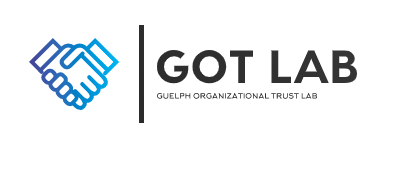
As organizations change, so too must our approach to managing them. One of the most significant trends across several industries in recent years has been the decline of strict, hierarchical organizations in favour of increasingly lateral, team-based structures. As these organizations become flatter, softer approaches to influence and leadership become increasingly necessary for maintaining and maximizing employee performance. Of the various ways to manage lateral workplaces, trust is repeatedly shown to be one of the most important for achieving a high level of cohesiveness, performance, and well-being.
At the Guelph Organizational Trust lab, we use multiple theoretical and methodological approaches to understand how trust develops, as well as the effects that it has on both employees and organizations. We look at questions such as how trust forms between leaders and subordinates, the development of trust across various in-person and virtual organizational structures, and the effects of trust on a variety of employee and employer outcomes. To answer these questions, we employ a variety of experimental and non-experimental research approaches with both students and working populations. Our research is disseminated to both academics and practitioners through publication in journals, and panel talks with industry representatives at conferences.
The trust lab places a strong emphasis on providing opportunities for undergraduate and graduate student development, mentorship, and collaboration on research projects and publications. Our spacious and renovated facilities feature a board room, three ‘break-out’ meeting rooms, and a fully-functional computer lab.





